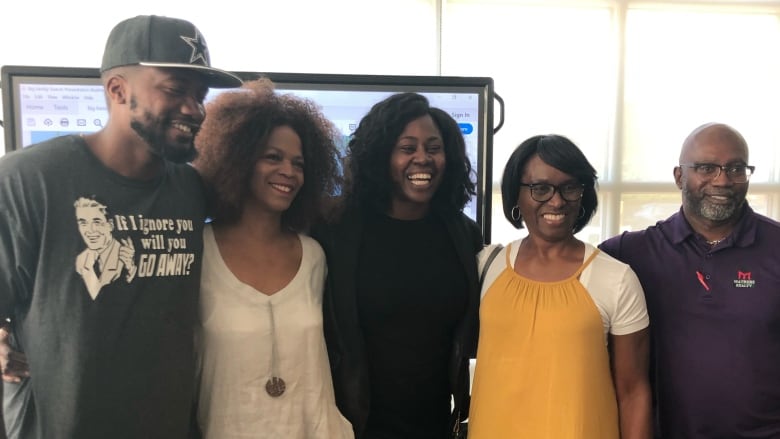Texas woman whose family was separated by slavery traces roots to N.S.
Pamela Bailey's distant relatives could have ended up here as refugees after War of 1812

When Pamela Bailey took a DNA test in 2017 she was shocked by how far the branches of her family tree reached.
The Texas-based author and artist has ancestors from South Carolina who were forced apart by slavery. She learned she had relatives living from coast to coast in the U.S. and into Nova Scotia.
Through a genealogy project she calls the Big Family Search, Bailey is piecing together her past. She has met people who share the same family stories, despite being separated for more than a century.
But she still has questions about family members who ended up north of the border.
"These are men and women who had children, who formed families, who loved their families but for various reasons were sold away, hired out, who were given as inheritance, who were lost in gambling debt," Bailey told CBC's Information Morning.
"And so even in that history, my family has been able to hold on to stories that show us who we really were."
All Bailey knows about her connection to Nova Scotia is that it is on her paternal side. They had the last name Campbell and lived in Clarendon County, S.C.
It's possible they arrived here after the War of 1812 when thousands of black refugees were offered freedom in Canada.

But it was a "quasi-freedom," said Afua Cooper, a professor at Dalhousie University and chair of the panel on Lord Dalhousie's relationship to race and slavery.
Cooper co-authored a report on Lord Dalhousie that was published in September, which provides an account of the dark and little-known history of slavery in this province.
Many black refugees who arrived after the war were re-enslaved, forced into indentured labour or shipped back to the United States and to the West Indies, Cooper said.
"Coming to Nova Scotia and New Brunswick and ... Prince Edward Island and attempting to make a living and just having to face this hostility from the white community, it was very, very traumatic on families and on individuals and I think that has been passed down through the generations to present time," she said.

It's possible Bailey's relatives also arrived earlier, in the 1780s, when more than 3,000 Black Loyalists, who fought with the British during the American War of Independence, arrived in Nova Scotia.
White Loyalists also came and brought with them up to 2,000 black slaves.
"That really intensified slavery within Nova Scotia because now you had thousands and thousands of black slaves within the province doing all kinds of work," said Cooper.
The report on Dalhousie's connection to slavery is full of stories of families and individuals forced apart from their loved ones. They are people like Gabriel Hall from Preston, who is described in one historical document as "one of the orphan children" to arrive in Nova Scotia, Cooper said.
"So there were a whole bunch of kids who arrived without parents," she said. "Did their parents die in the war? Were they somehow rescued from slavery and their parents remained? Nobody knows. But what we have is a lot of family breakup, a lot of trauma of people losing their families."
Thanks to the proliferation of DNA testing and social media, Cooper said she knows people in Nova Scotia who, like Bailey, are reconnecting with family members separated by slavery and forced migration.
For Bailey, learning about her family tree has shown her that slavery isn't something of the past. It's also allowed her to learn about the accomplishments of her ancestors who endured so much and persevered.
"I've been able to find my family active in World War I, World War II," she said. "These are stories that are not written in textbooks or even history books but I've been able to find them in records."
She's met relatives from across the United States, and was even sent a photograph of her great-great grandmother, Laura Adkinson Campbell Singletary, from a man in California who was related to her, but whom she'd never met.
"It has just been amazing to find that this is family that has been disconnected in many cases for over 150 years, and yet when I reconnect with them, it feels like family," she said.
MORE TOP STORIES
With files from CBC's Information Morning